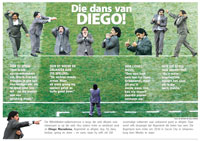
Subscribe & Follow
In the news
World cup: newspaper editors innovate amid circulation decline
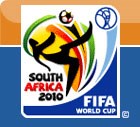
In this country, online news doesn't do a lot of investigative journalism - it's the obvious niche if you are a newspaper man defending your circulation from online's straight-up reporting and opinion. National weekly Mail & Guardian took this approach, one that editor Nic Dawes describes as dancing SA's complicated rhythm and which combined vigorous investigation with some flag-waving, nation-building and partying. Others, such as KwaZulu-Natal's The Mercury, grabbed the opportunity to think outside the box and re-engage with visual journalism.
Didn't sell more papers
Even so, editors agree that the world cup did not sell more papers. Nearly across the board they reported circulation losses year-on-year for the duration of the event. Dawes describes the period as a December holiday in the middle of the year. Eastern Cape's Daily Dispatch editor Andrew Trench likens it to having 30 public holidays in succession and notes the incredibly long school break and the absence of the Golden (rush) Hour in the morning where most street sales take place.
In spite of circulation declines, newspapers still worked hard to prove themselves relevant and flexible. Broadly speaking, they succeeded in their strategies to make their coverage relevant to their community of readers. In each case, the editor played a pivotal role in defining their teams' response to the world cup, from initiating suits in the name of the Promotion of Access to Information Act to flying the patriotic flag and embracing globalisation.
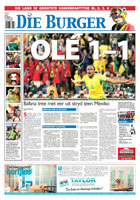
In the Western Cape, Die Burger editor Bun Booyens and his team had to come up with a new set of Afrikaans words to describe and translate fan walks (which became 'lekkerlooproetes') and fan fests (now called 'jolkolle').
Booyens admits that his Afrikaans language paper was caught by surprise by the almost spontaneous way in which Afrikaans language speakers, not generally considered a key soccer market, got caught up in world cup fever. "People who have never watched a soccer match in their life followed every game," says Booyens. "Rugby fans switched to soccer almost overnight."
Suddenly adapt to reader demand
Traditionally, rugby receives extensive front page coverage by Die Burger, which had to suddenly adapt to reader demand for world cup coverage. To its credit, adapt it did with extensive front page new coverage of the event.
For The Mercury's editor Angela Quintal, the world cup represented an opportunity to throw off the conservative image of newspapers (and especially regional newspapers in this country) and create an innovative media experience for her readers.
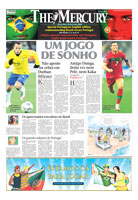
Not only did she refocus on quality content for her paper, she also introduced colourful mastheads, carried the front pages of newspapers from the countries whose teams were playing in her city and even produced a four-page Portuguese language wrap-around for the Brazil vs Portugal game played in Durban [for the full story, see Bizcommunity.com's interview with Quintal tomorrow, Thursday, 22 July 2010].
The Mail & Guardian, as a quality, national weekly, appreciates that South Africans live quite comfortably with contradiction, and coupled vigorous investigation with a sense of excitement it felt it shared with the citizens of the country, according to Dawes.
Release of tender documents
It brought and won a case for the release of tender documents against the Local Organising Committee (LOC) and revealed how world cup chief organiser Danny Jordaan's younger brother was
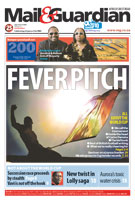
appointed by Match Event Services to act as its liaison in Port Elizabeth for R200 000 a month. It also produced good sports journalism under the leadership of journalist Mark Gleeson and it tapped into the content pool of The Guardian in the UK.
Dawes suspect that local media might have gone overboard with the rah-rah stuff and admits his own paper wasn't critical enough in its interrogation of the LOC or of FIFA in the run-up to the event. Nobody wants to be seen as a party-pooper. His paper will be keeping this in mind as local organisers start jockeying for a potential bid for Olympic Games in the near future.
The Daily Dispatch, based in East London and relatively far removed from the sporting action in Port Elizabeth, had to think hard to find a voice relevant to its community which already felt excluded from the action, thanks to the flopped attempts of Buffalo City Municipality to lure a world cup team to use the city as a base.
Trench decided on an unapologetically patriotic tone and a focus on 'feel good' stories to bolster 'gees' in his community. He took time to explain his decision to both his readers and his staff [read the background thinking to Trench's decision in an interview to be published on Biz on Friday 23 July]. It's a good example of an editor instinctively feeling the mood of his readers and realising he needs to find an alternative route to their hearts and minds.
Underscores diversity
In an industry where journalists often despair over the rule of 'bean counters', who stare only at the bottom line, the level of flexibility that most people only associate with new media and the level of reader engagement which editors sought with their readers are certainly positive news. The positions staked out by the editors of the vastly different Daily Dispatch, The Mercury or the Mail & Guardian, to name but a few, are all well thought-out and specific to the situation of their core constituencies. It underscores diversity among our media - something that we would do well in celebrating.

About Herman Manson: @marklives
The inaugural Vodacom Social Media Journalist of the Year in 2011, Herman Manson (@marklives) is a business journalist and media commentator who edits industry news site www.marklives.com. His writing has appeared in newspapers and magazines locally and abroad, including Bizcommunity.com. He also co-founded Brand magazine.Related
Adtopia expands network reach 21 Nov 2024 News24 journalists take top honours in 2024 Vodacom Journalist of the Year Awards 8 Nov 2024 US-based MDIF exits Mail & Guardian, sells to local shareholders 31 Oct 2024 2024 Vodacom Journalist Awards: Regional winners for Gqeberha 2 Oct 2024 Netwerk24’s new decade: From the editor 22 Aug 2024 All the Standard Bank Sikuvile Journalism Awards winners 21 Jul 2024














